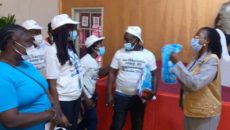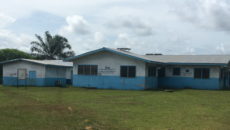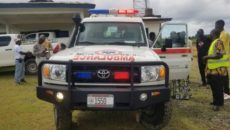BUCHANAN, Grand Bassa – The Independent National Commission on Human Rights is currently conducting a nationwide survey on the right to health and welfare.
The survey, which began early this month, is being done simultaneously across the country with commissioners being assigned to each of Liberia’s regions. It is expected to conclude at the end of this month and considers physical, mental, and psychological health of people in Liberia.
According to the acting commissioner of INCHR, Bartolomeo Kollie, the survey will detail issues affecting people in both urban and rural communities in the country as it relates to health.
“In this survey, we are looking for affordability, accessibility, and nondiscrimination in terms of providing health services to the people, ” Kollie told The Bush Chicken during an interview in Buchanan.
The survey targets three categories of people: members of the county health team, doctors and nurses in both private and public medical facilities, and civil society organizations. Kollie said questions ranging from human resource management, availability of drugs at medical facilities, and the relationship between the community and health workers are key to the survey.
“We are considering quality of health facilities, equipment, the well-being of health workers, patients, and whether drugs are available and affordable, and also people with disabilities – to what extent medical facilities are available and accessible to them,” Kollie said. “[In] some areas, drugs are available; sometimes, limited drugs, and sometimes, no drug at all. If no drugs, what are the alternatives? Then you prescribe drugs for them to go to the nearby drug stores and buy drugs. What if they cannot afford? Their right to health, which links to right to life, is under attack.â€
He added that the government’s budgetary support to the health sector will be assessed to find out whether the government is adequately financially supporting the health sector. The survey would also examine the ratio of doctors to patients in the country, comparing the results with the World Health Organization’s recommended figure of 1,000 people to one medical doctor.
“As an advisory arm of government, we believe that when the report comes out, it will give [the] government leeway to intervene,” Kollie said. He said when the report is released, it will serve as an eye opener for the government to see the need to increase its support to health throughout the country, taking into consideration that healthcare is a right, not a privilege.
The report may not be completed yet but many of its findings will come as no surprise to the public, as the shortage of drugs in public health facilities is a major health concern. This situation has become so alarming that some prominent Grand Bassa residents have begun asking officials to get a better understanding of the issue.
In a recent town hall meeting, Joseph Gblozeo, the general town chief of Mah section in Grand Bassa’s first district, asked the superintendent of Grand Bassa, Janjay Baikpeh, to account for why nurses are prescribing drugs for patients in his district instead of providing the drugs at the health facilities.
Gblozeo said nurses assigned at clinics in the district usually prescribe drugs for patients to purchase outside. Many of those patients are poor and cannot afford to purchase the drugs, he said; moreover, there are some rural areas that have no drug stores.
The Liberian Government Hospital in Grand Bassa has also been noted to issue prescriptions for essential drugs for patients. Isaac Bannie, the former administrator of the hospital who now heads Phebe Hospital in Bong, confirmed that this happens due to a shortage of drugs. He attributed the shortage to a population increase.
Community members often believe that health workers are pilfering the drugs for their personal use or to sell for profit. During a 2016 meeting held between community members and health workers in Grand Bassa’s second district, residents brought forth some of those complaints against health workers.
In March, several boxes of drugs and medical supplies were confiscated at a security checkpoint in Grand Bassa. Police investigation later unveiled that they were taken from the St. Francis Hospital in River Cess, where the hospital’s pharmacist, Johnette Cooper, had colluded with others to smuggle out the supplies.
Featured photo by Sampson David



